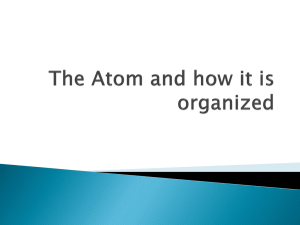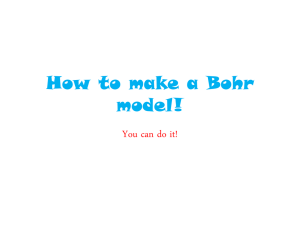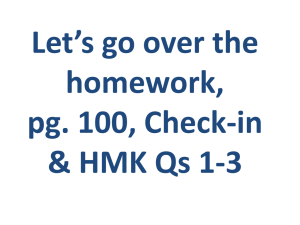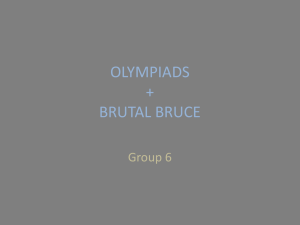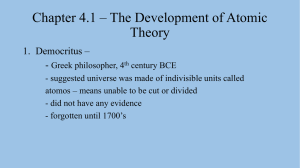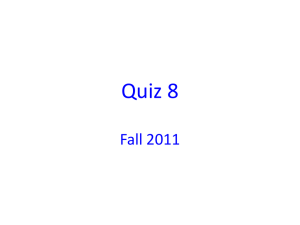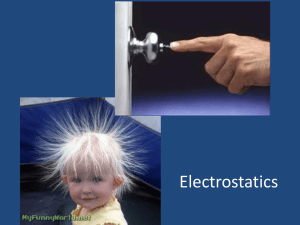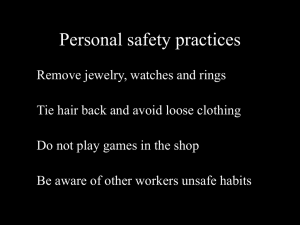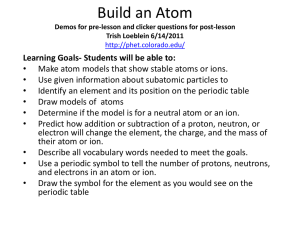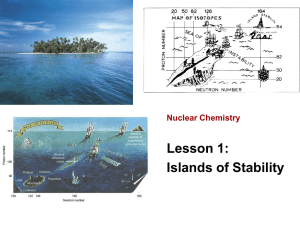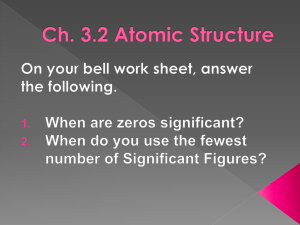X Unit 4 Test Review_with answers
advertisement
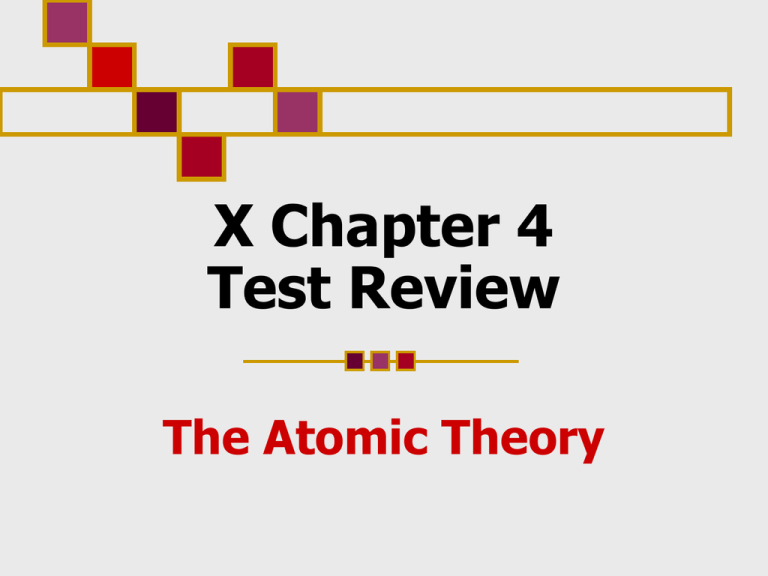
X Chapter 4 Test Review The Atomic Theory The smallest particle that still retains the property of an element is called what? A. neutron B. atom C. electron D. molecule In the Schrödinger model, what is the name for where an electron is found 90% of the time? A.Energy level B.Isotope C.Ground D.Orbital state The higher energy level for an electron is called what in the Bohr model? A. ground state B. orbital C. excited state D. energy level What must be equal in a neutral atom? A. B. C. Neutrons and protons Electrons and neutrons Protons and electrons Atoms with a charge are called what? A. B. C. D. Ions Cations Anions Isotopes In the isotope notation shown below, what does the Z and A stand for? Z X A A. B. C. D. Z Z Z Z = = = = atomic symbol, A = atomic # mass #, A = atomic # mass #, A = atomic symbol atomic #, A = mass # Who discovered the electron? A. B. C. D. JJ Thomson Robert Millikan Ernest Rutherford James Chadwick Who discovered the nucleus? A. B. C. D. JJ Thomson Robert Millikan Ernest Rutherford James Chadwick What is the mass number if an atom has 14 neutrons, 15 protons, and 16 electrons? A. B. C. D. 45 31 30 29 How many protons, neutrons, and electrons are in the following sample? 80 Br 35 A. B. C. D. p+ p+ p+ p+ = = = = 35, 35, 45, 35, n n n n = = = = 45, 80, 35, 45, eeee- = = = = 80 35 45 35 How many protons, neutrons, and electrons are in the following sample? 59 Co2+ 27 A. B. C. D. p+ p+ p+ p+ = = = = 27, n = 32, 32, n = 27, 27, n = 32, 27, n = 59, eeee- = = = = 27 32 25 25 What is the isotope notation for phosphorous-31? A. 3115P B. 1531P C. 4615P D. 3015P What is Rutherford’s famous experiment in which he discovered the nucleus? A. B. C. D. Oil drop experiment Cathode ray tube experiments Gold-foil experiment Plum pudding experiment Who is credited with the plum pudding model of the atom? A. B. C. D. JJ Thomson Robert Millikan Ernest Rutherford James Chadwick Who discovered the neutron? A. B. C. D. JJ Thomson Robert Millikan Ernest Rutherford James Chadwick What is the atomic number equal to? A. B. C. D. The # of electrons in the atom Sum of protons & neutrons in the atom The mass number The # of protons in the nucleus What is the mass number equal to? A. B. C. D. The # of protons in the nucleus The sum of the protons & neutrons in the nucleus The # of electrons in the atom The charge on an ion Which of the following are found in the nucleus of an atom? A. B. C. D. E. protons neutrons electrons More than one of the above None of the above Which of the following pairs below are isotopes? A. B. C. Carbon-12 and Carbon-13 Uranium-238 and Neptunium-238 Chlorine-35 and Fluorine-19 What is the atomic mass on the periodic table equal to? A. The weighted average of the masses of all naturally occurring isotopes B. The sum of the protons & neutrons in the nucleus C. The number of protons in the nucleus Schrodinger is credited with which model of the atom? A. B. C. D. The plum pudding model The billiard ball model The quantum mechanical model The Bohr model How many protons are in the nucleus of a nitrogen atom? A. B. C. D. 14 protons 21 protons 7 protons 8 protons How many neutrons are in the nucleus of a Iodine-127 atom? A. B. C. D. 53 neutrons 127 neutrons 180 neutrons 74 neutrons What does the 34 represent in sulfur-34? A. B. C. D. Atomic number Mass number Atomic mass Electrons in the atom If an iron ion has a charge of +2, how many electrons does the ion have? A. B. C. 24 electrons 26 electrons 28 electrons
